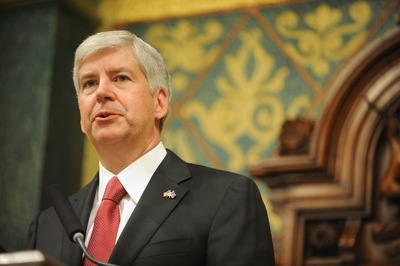Following a marathon lame duck session where a flurry of bills were passed by the Michigan Legislature, state lawmakers are preparing for the start of a new legislative session.
Gov. Rick Snyder and the Republican-led Legislature have done a tremendous amount of work over the last two years catering to the business community — reforming the state tax code to dramatically reduce the taxes business pay while making budget adjustments to offset lost revenue.
The past legislative session also saw the GOP push through a social agenda that imposes new restrictions on abortion clinics and bans domestic partner benefits for public employees.
But other issues remain to be addressed, says Kirk Profit of Governmental Consultant Services Inc., a Lansing lobbying firm that represents a number of local governments.

Kirk Profit
Ryan J. Stanton | AnnArbor.com
Profit, who represented the east side of Washtenaw County in the Michigan House from 1989 to 1998 and chaired the influential House Tax Policy Committee, sat down with AnnArbor.com to talk about the upcoming legislative session and the issues that might bubble to the surface in 2013.
AnnArbor.com: What issues do you think will shape the 2013-14 legislative session? And what might we see coming out of Lansing that impacts us here in Washtenaw County?
Profit: I think the overwhelming emphasis over the last two years has been on the business climate, especially in the context of 'job providers,' and more specifically private-sector employers. There's been some emphasis on public employers, and especially in the context of public employee compensation.
I think if you were to do dashboards on the state right now, the dashboard for private employers has to be very strong. The dashboard for public employers has to be improving.
But then you go to some of the other dashboards. The dashboard for transportation would certainly be one that needs improvement. The dashboard for K-12 education is one that needs improvement. The dashboard for higher ed, especially support from the state, needs improvement. The dashboard for health care, certainly in transition with the Affordable Care Act, needs improvement. The dashboard for urban vitality and urban viability is one that needs improvement.
So each one of those dashboards where you find a 'needs improvement' qualification is going to have to be addressed. That's a huge agenda, but obviously this governor and this Legislature have shown an ability to be pretty aggressive with the agenda, as we saw most recently in the lame duck session. I suspect each one of those areas of the overall state dashboard will be addressed.
AnnArbor.com: Your lobbying firm represents a number of our local governmental units, including the city of Ann Arbor, Ypsilanti, Ypsilanti Township, Washtenaw County, the University of Michigan and Washtenaw Community College. Are there any pieces of legislation that you can tell me right now you'll be working to advance on their behalf in the coming year?
Profit: There's a whole area of blight remediation, especially on the east side of the county, that we need to address. There are a number of budget items. The governor will issue his budget in early February. He'll have the State of the State on Jan. 16, and then the budget message will follow.
We continue to be a strong advocate with the city of Ann Arbor and the city of Ypsilanti especially for fire protection grants. The area of revenue sharing continues to be an area that needs to be addressed. We've been working closely with the executive office on trying to make sure that revenue sharing goes where the people are and not just where people vote. Obviously I'm here in Ann Arbor today, and if you look around there are 80,000 people who come into Ann Arbor every day, but their revenue-sharing dollars follow them where they vote and not necessarily where they are every day. We need to do a better job of having revenue sharing and other state support follow people where they are during the course of the day and not just where they sleep or vote.
AnnArbor.com: For Ann Arbor, would that be a way around a city income tax? A different mechanism to enhance revenues at the state level?
Profit: It's a better allocation of resources. If you go around the state, you'll notice a lot of areas that have very attractive community offices, but there aren't that many people who live there. They sleep there, but they don't actively live there during the course of the day. They're going primarily to the areas of commerce, areas of education, areas of health care — the commercial sectors where people spend most of their daily lives. That money needs to be better allocated and I think the executive office recognizes that. The challenge is how to get there.

Gov. Rick Snyder delivers his State of the State address in 2012. His next State of the State for 2013 will be at 7 p.m. Jan. 16.
Angela Cesere | AnnArbor.com
Profit: Absolutely. And communities the provide a whole array of public service, whether it's commerce, health care, education. All manner of public service and commercial service tends to happen in the urban core and that factor needs to be recognized when we send money from the state. That's where the infrastructure is — the water, the sewer, the police, the fire and all these services are in those areas where the people are and the money needs to follow.
AnnArbor.com: What are your predictions for the upcoming state budget process? Where might we see some tug of war with dollars?
Profit: The process is pretty smooth with one-party control. I don't expect a lot of unrest. I think the governor and the Legislature two years ago established the tax code they want, dramatically downsized the base spending of each budget — education obviously. Higher ed was cut 15 percent and K-12 was cut dramatically. But those budgets were sized to fit the current state tax code. Once that was done, the way forward procedurally and politically in Lansing gets a lot easier.
AnnArbor.com: What are your predictions for what might happen in the next year in terms of funding for local governments?
AnnArbor.com: We've made progress each year. Fire protection grants actually were zeroed out at one point under Gov. John Engler. We brought it back to about 65 percent of full funding. We're going to keep making progress. I think our case is strong on the merits.
With respect to revenue sharing, there are two pots of money. There's statutory revenue sharing, which is basically the EVIP piece now. That's dramatically diminished, and to be fair that has caused some of the big challenges in local government vitality. When you take what was once close to $1 billion in statutory revenue sharing down to $200 million, that has significant impacts locally.
The other pot of money — the constitutional revenue sharing piece — currently goes exclusively by constitution according to where the population is. That's the piece I was mentioning earlier where we need to define population as where people are and not just where they sleep or vote.
At some point, the state is going to have to come to grips with local government financing in a broader sense, because just confining a local government to a property tax base and telling the people who live there they have a certain quality of life limited dramatically by whether they have property wealth is not a good structure. The state has clearly moved away from property tax as its primary source of financing operations and they should give local governments the same kind of opportunities —Â so that we're not telling people they have a great quality of life if they have great property wealth and they have a dramatically diminished quality of life if they have diminished property wealth.
There are some areas of the state that don't have enough property wealth per person to actually do all of the functions of the city, and yet we have incredible investments in infrastructure, we have a number of people living there, we have housing stock.
AnnArbor.com: A bipartisan report released in 2012 showed Michigan's roads and bridges are falling into worse shape and more than $1.5 billion in additional annual funding is needed to properly maintain them or it will cost us even more in the long run. The governor has expressed a desire to fill that gap, but couldn't seem to get the Legislature to take up the issue this past session. What's happening on that now? Will we see some movement to increase money for roads in 2013?
Profit: The governor has been solid on the issue. He needs to get the Legislature to come along. I think they're getting closer. There was a lot of dialogue last year. It was a difficult year to try to do a tax increase in the middle of an election, but I think they'll make progress this year.

From left to right, Democrats David Rutledge, Gretchen Driskell, Adam Zemke and Jeff Irwin will represent Washtenaw County in the Michigan House of Representatives for the next two years. For the past two years, Washtenaw County had two Republican and two Democratic representatives in the House but Rick Olson and Mark Ouimet are gone now.
Ryan J. Stanton | AnnArbor.com
We're going to see next spring — when everything thaws out again — that roads continue to worsen. And in terms of the place we want to live and the place where businesses want to come, we've got the tax code right from their perspective, we've got the regulatory environment right from their perspective, the labor environment right from their perspective. But I suspect those folks still are not interested in driving on our roads, going to many of our schools and living in a lot of our communities — all those other factors that need to be addressed.
AnnArbor.com: What do you think will happen with the new four-county regional transit authority for Southeast Michigan? Will Washtenaw County stay in or get removed?
Profit: I would totally defer to our clients on that. The city of Ann Arbor, who actually owns the transit system (AATA), obviously has certain opinions about. I think the opinion of the county, which is obviously extremely relevant as well, currently is that they don't want to be in it under the current resolution that's still out there. But obviously Commissioner Conan Smith is very interested in the county being in it, and I'm not sure how that plays out.
I would anticipate the city of Ann Arbor and the county will work together on this and figure out how they want to be. But you've got a bunch of local communities that just voted not to have a countywide regional transit structure, so I don't know how it shakes out, to be honest.
And obviously for us, we'll be wherever our clients want us to be in terms of our advocacy. I'm pretty confident that good decisions will be made and a good direction will be taken. I expect it will work out and we'll have a pretty good transit system going forward. One interesting aspect of it is the Ann Arbor Transportation Authority belongs to the city of Ann Arbor and its taxpayers, so at some point the issue of what the county can do with the city's transit authority has to be addressed.
AnnArbor.com: I know the Democrats are gaining five seats and the Republicans are losing five seats in the 110-member House starting this month. Does that really change much?
Profit: The margins are narrower, so yes. Obviously the majority caucus continues to be the majority. But when you had a 64-46 split, you could have a lot more members released from certain difficult votes. When you only have 59, you can only lose three. So it can tend to require a little more bipartisanship. The margins get closer, but they still have the majority.
AnnArbor.com: We saw a significant amount of legislation passed in November and December. As I understand it, 42 percent of all bills passed in the last two years came during lame duck. It's almost two years away, but what issues might get pushed off until the next lame duck?
Profit: I wouldn't predict any of them. I think if they wait two years to do a transportation package, if they wait two years to resolve certain education problems, if they wait two years to restore urban vitality and viability, if they wait two years to deal with the health care challenges — if you wait two years and try to deal with all those post-election, that will have consequences in November of the next election. I can't envision they would wait that long to deal with these issues.
Ryan J. Stanton covers government and politics for AnnArbor.com. Reach him at ryanstanton@annarbor.com or 734-623-2529. You also can follow him on Twitter or subscribe to AnnArbor.com's email newsletters.